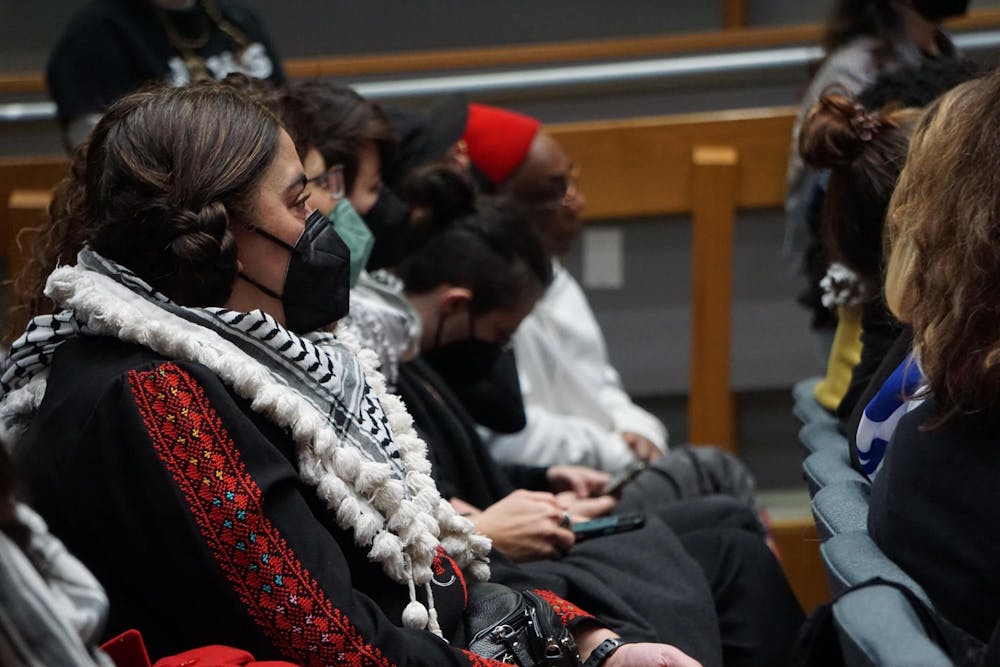After over two hours of public comments and deliberation, Durham City Council voted 5-2 to pass a resolution calling for a cease-fire and an end to violence in the ongoing Israel-Hamas war. The resolution was passed just before 1 a.m. Tuesday morning.
Council members Carl Rist, DeDreana Freeman, Javiera Caballero and Nate Baker, along with resolution author Chelsea Cook, voted in favor of the resolution. Mayor Pro Tempore Mark Anthony Middleton and Mayor Leonardo Williams voted against it.
Durham now joins Carrboro as the second city in North Carolina to call for a cease-fire, alongside 70 other cities nationwide that have passed similar resolutions.
Over 200 community members also showed up at the city council meeting to voice their opinions on the resolution.
Ten pro-Israel and 30 pro-Palestinian speakers addressed the council prior to the vote. Chief among their concerns was the language of the proposed resolution: pro-Israel speakers protested the fact it did not name Hamas, while pro-Palestinian speakers thought the resolution should have called for a permanent cease-fire and labeled Israel’s actions as genocide.

In solidarity with all Palestinian children affected by the war, pro-Palestinian protesters held clementines symbolizing Imad Abu Al-Qare’a, a three-year-old Palestinian boy killed by Israeli snipers on his way to retrieve clementines from a street vendor.
Immediately following the resolution’s passage, Freeman motioned to amend the resolution to include the word “genocide.” Her motion was met with cheers and support from many members of the crowd.
“This is not the best representation of Durham right now, and that is what is most hard to swallow,” Freeman said. “And I just want to make sure that we are doing our best to represent Durham in stating very clearly that anytime that you’re using weapons of mass destruction to kill children, it is not okay. And that is just it — there is no other side to this.”
Williams quickly shut the motion down and responded that Freeman had four months to make the amendment, and that choosing to do so after the resolution’s passage was prolonging a process that had already gone on for long enough.
“We have had four months to negotiate with one another, and I do not want us to, after the vote, take this any further than where it has gone,” he said. “Now we need to act on what we passed.”

During the deliberation, many council members spoke on the personal and sensitive nature of the subject. They also gave their thoughts on the resolution and provided rationale for their voting decisions.
Baker outlined nine reasons why he felt that the resolution should be passed, including the fact that labor unions across the country were calling for a cease-fire.
Caballero largely agreed with Baker, adding that passing the resolution symbolized a “response [of the] global south against deeper things around imperialism and militarism” and emphasizing the importance of human life.
Rist felt that the resolution reflected policy disagreement with the Israeli government.
“What I’m hearing simply is that you all feel like your federal government, our federal policy, is out of line with your values as people. Values of peace, and the value of individual life,” he said.
Freeman expressed frustration with the language in the current resolution, which she felt reflected an unjust power structure within the conversation.
“It is sheer power that keeps us silent,” she tearfully said. “It is sheer power that keeps us confused, it keeps us misdirected, and in so many ways.”

Get The Chronicle straight to your inbox
Sign up for our weekly newsletter. Cancel at any time.
Cook felt a personal connection to the topic of the resolution, as the author and a member of the Jewish community.
“As a Jew, it breaks my heart that we have tied ourselves to this idea of Zionism such that we can’t really interrogate the actions of a government as separate from our religion,” Cook said.
Cook also thanked her colleagues for supporting her as she went through the process of proposing a resolution.
Middleton explained that he could not vote for the resolution because he could not logically defend its policy solutions. He claimed that creating a “prescriptive policy solution” was too far, but agreed that passing a resolution was within the purview of the city council.
“For me, this isn’t about the spirit of the resolution, it’s about me being able to have intellectual integrity in defending it,” he said.
Middleton specifically called out the language in the resolution, saying that the words “disproportionate” and “ceasefire” could not coexist without calling for a two-state solution. He urged the council to take more time to tweak the resolution before voting on it.
Williams felt that a unanimous decision in passing the resolution would not reflect the will of Durham residents. He noted that he was “absolutely exhausted” and that “ignorance isn’t always intentional.” He also requested the city’s grace because he knew passing the resolution would “tear this community apart.”
“I want to make sure that the decision of this council reflects the community, and I hope that we show up for the things that we can actually invoke policy and make impact on right here in Durham as well,” Williams said.

Claire Cranford is a Trinity sophomore and features managing editor for the news department.

